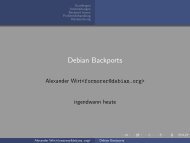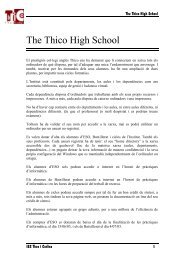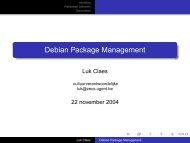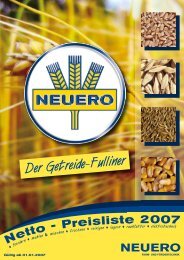Free Software In Biology Using Debian-Med: A Resource For ...
Free Software In Biology Using Debian-Med: A Resource For ...
Free Software In Biology Using Debian-Med: A Resource For ...
You also want an ePaper? Increase the reach of your titles
YUMPU automatically turns print PDFs into web optimized ePapers that Google loves.
stallations across institutions is coordinated and supervised by so<br />
called virtual organisations (VOs). Those define Runtime Environments<br />
(REs) and clusters adhering to such specify such in their<br />
description that is utilised in the selection of clusters feasible for a<br />
job’s execution.<br />
To deploy one’s algorithms and data, the programs are submitted<br />
as source code and (unless programmed in interpreted scripts or<br />
other hardware-independent languages) compiled prior to execution.<br />
VOs may ease this burden and require the sites to install a<br />
minimal set of programs for every machine by the inclusion on<br />
an RE. While this has been proven to be very functional for the<br />
grids’ roots in particle physics, for bioinformatics, with its vast heterogeneity<br />
of small applications and comparatively tiny databases,<br />
even if an agreement could possibly be reached in a VO, the effect<br />
could hardly be maintained by a site’s maintainer.<br />
1.2 Status of <strong>Free</strong> <strong>Software</strong> in <strong>Biology</strong><br />
Common programs like a web server, or a mail user agent are installed<br />
on most computers and have a very large user base. Knowing<br />
this, many gifted programmers feel obliged for this kind of <strong>Free</strong><br />
<strong>Software</strong> - they just need it for their own and they know to make<br />
a difference to the world. So one finds a fast, growing community<br />
around <strong>Free</strong> <strong>Software</strong> packages that have a widespread use.<br />
<strong>For</strong> specialised software in general and particularly for biological<br />
software, one needs to first explain what a particular software does.<br />
Often the developers get their satisfaction not from the software but<br />
from the excitement of extra insights in biological processes - the<br />
beauty of which is likely not to be accessible to regular software<br />
enthusiasts.<br />
As a view shared by many in Open Source Bioinformatics, Ewan<br />
Birney of the EnsEMBL [11] project stresses Open Source to "ensure<br />
scientific progress". He also laid out that the Open Source of<br />
programs is a comparatively trivial issue when compared with the<br />
openness of biological data. The latter is often far more expensive<br />
to produce. While giving the data away might possibly diminish<br />
one’s competitive advantage, the sharing of a program with others<br />
and respective citations is well accepted as fostering one’s career.<br />
1.3 <strong>Debian</strong>, distributed computing, and bioinformatics<br />
This paper presents a development from the <strong>Debian</strong> Linux <strong>Free</strong><br />
<strong>Software</strong> community that offers solutions to the prior mentioned<br />
problems. The basic idea is to automate updates, to share maintenance<br />
load under governance of a peer controlled strict policy and<br />
to use asymmetric cryptography for the packages’ integrity and authenticity.<br />
The underlying technology may be applied to any program<br />
and be run independently from <strong>Debian</strong>. The technology has<br />
been ported to 11 different platforms, hence providing a considerable<br />
freedom in the selection of hardware.<br />
A subproject of <strong>Debian</strong> is <strong>Debian</strong>-<strong>Med</strong>[23], a Custom <strong>Debian</strong> Distribution<br />
[24], supporting users with a special interest in medical<br />
and biological problems. The common goal of all CDDs is to make<br />
installation and administration of computers for their target users<br />
as easy as possible, and to serve in the role as the missing link between<br />
software developers and users well. The importance of this<br />
technology for computational grids and information agents has not<br />
been presented before.<br />
2. METHODS<br />
2.1 Unique technology supporting <strong>Debian</strong>’s principles<br />
in packaging<br />
2.1.1 .deb packages<br />
Most distributors ship their distribution in binary packages. Two<br />
package formats are widely used[10]:<br />
RPM (RedHat Package Manager) which is supported by Red-<br />
Hat, SuSE, Mandrake and others.<br />
DEB (<strong>Debian</strong> Package) used by <strong>Debian</strong> and derived distributions.<br />
It is this adherence to policy that causes a distribution to remain<br />
consistent within its own bounds. At the same time, this is the<br />
reason why packages can not always be safely installed across distribution<br />
boundaries. A SuSE package.rpm might not play well<br />
with a RedHat package.rpm, although the packages work perfectly<br />
well within their own distributions. A similar compatibility<br />
problem could also apply to packages from the same distributor,<br />
but from a different version or generation of the distribution.<br />
<strong>For</strong> <strong>Debian</strong>, all files of a program are packed as the ar archiver,<br />
otherwise known for the creation of programming libraries. Every<br />
such DEB package has a companion source package from which<br />
the binary package may be built automatically. The distributions of<br />
SuSE, RedHat and derivatives use the RPM format. The program<br />
alien by Joey Hess (not to be mistaken for the Grid environment<br />
at CERN) can translate between these. Though scripts to be run<br />
upon installation may get lost in the translation process.<br />
2.1.2 Build daemons<br />
Sites external to the <strong>Debian</strong> main distribution may offer packages<br />
only for a subset of architectures. The <strong>Debian</strong> main distribution,<br />
however, automatically compiles software for all 11 architectures<br />
that are supported by the <strong>Debian</strong> effort. To get a package into <strong>Debian</strong>,<br />
be it novel or an update of an existing package, the maintainer<br />
of a package submits the source code of the program together<br />
with his changes on the code to create the package. The build daemons<br />
(or autobuilders) compile the packages for each of the supported<br />
systems and make the resulting package publicly available<br />
for download. Logs of the build platforms are available online for<br />
everybody’s inspection.<br />
2.1.3 Bug tracking system<br />
Users should give immediate feedback about problems arising in<br />
using a package. They always have the choice of reporting these to<br />
the upstream developer, usually per email. A particular strength of<br />
Source<strong>For</strong>get.net is to bring users of a particular software together.<br />
Earlier than this effort was the <strong>Debian</strong> Bug Tracking System (BTS).<br />
The maintainer of a software can decide if the bug should be forwarded<br />
to the upstream developers of the package or if it is fixed<br />
by himself. All problems are made public and hence the whole<br />
community may contribute to solving a particular issue.<br />
2.2 Divide and conquer of package maintenance<br />
The <strong>Debian</strong> Project is an association of individuals who share the<br />
intention to create the best possible free operating system. This operating<br />
system that which is created is called <strong>Debian</strong> GNU/Linux,<br />
or simply <strong>Debian</strong> for short. Everybody in the internet may initiate<br />
a site and offer packages for the installation in <strong>Debian</strong>. A local<br />
administrator has to decide, if this public source may be trusted.






